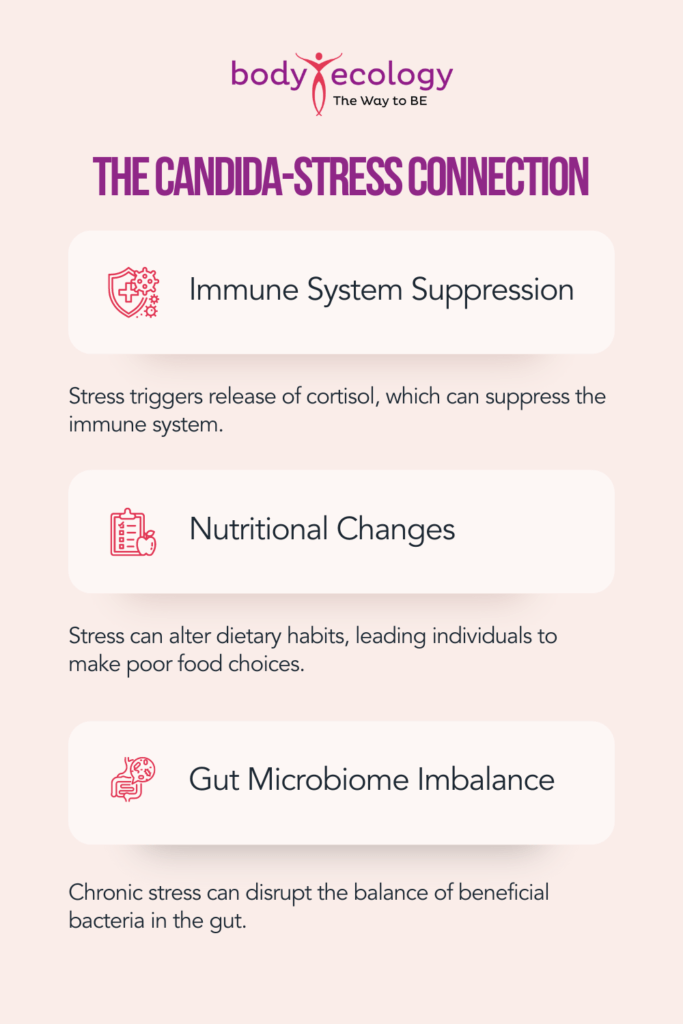Candida Connection: Stressors Contribute to Candida
Candida Connection: Stressors Contribute to Candida

Candida is usually harmless when balanced by the immune system. However, various factors can disrupt this equilibrium, leading to an overgrowth of Candida. One such factor that has gained attention in recent years is stress.
The Candida-Stress Connection
When stress becomes chronic, it can weaken the immune system. It can also disturb the balance of gut flora, and create an environment conducive to Candida overgrowth. Understanding this connection is crucial for both preventing and managing Candida-related issues.
1) Immune System Suppression: Prolonged stress triggers the release of stress hormones, such as cortisol, which can suppress the immune system. A weakened immune system is less effective at keeping Candida in check, allowing it to proliferate.
2) Nutritional Changes: Stress can alter dietary habits, leading individuals to make poor food choices. Diets high in sugar, refined carbohydrates, and processed foods provide an ideal environment for Candida to thrive. These diet changes can make Candida worse, causing more stress and making symptoms worse.
3) Gut Microbiome Imbalance: The gut microbiome plays a crucial role in regulating Candida levels. Chronic stress can disrupt the balance of beneficial bacteria in the gut. This results in Candida taking control and causing health issues.


Managing Stress for Candida Control
The health of the digestive system is central to how good we feel on a daily basis. Our mental wellbeing influences whether or not the bacteria normally present in the digestive tract are able to cause disease.
We have found that one of the best ways to consistently generate health is to eat fermented foods on a daily basis. If possible, at every meal!
Diet can help to modulate the effects of stress in the body. Especially when the diet:
1) Contains plenty of fermented foods. Fermented foods contain helpful bacteria that prevent overgrowth and infection when the body’s defenses are low.
Beneficial bacteria found in fermented foods and probiotic beverages do things like soothe intestinal cells that have become inflamed. These can also gently stimulate the movement of food through the intestinal tract. The multiple functions of beneficial gut bacteria are so important that some scientists refer to our inner ecology as a “virtual organ.”
2) Contains foods that support the growth of beneficial bacteria. This means choosing foods that keep the body in a slightly alkaline state.
Acidic foods cause inflammation and trigger the immune response. When stressed, avoid foods that add to the body’s workload and stress.
While everyone is different in their response to food, there are some foods that are notoriously pro-inflammatory and best avoided. These are:
- Foods with added sugar or refined sugar.
- Processed foods.
- Foods containing industry byproduct oils, such as canola, safflower, vegetable, soy, and corn oil.
Maintaining a healthy diet and practicing stress-reducing activities like regular exercise, relaxation techniques, and getting enough sleep are essential for keeping your body in balance and reducing the risk of Candida-related problems.

Reference
Meyer, H., Goettlicher, S., & Mendling, W. (2006). Stress as a cause of chronic recurrent vulvovaginal candidosis and the effectiveness of the conventional antimycotic therapy. Mycoses, 49(3), 202-209. https://pubmed.ncbi.nlm.nih.gov/16681811/











